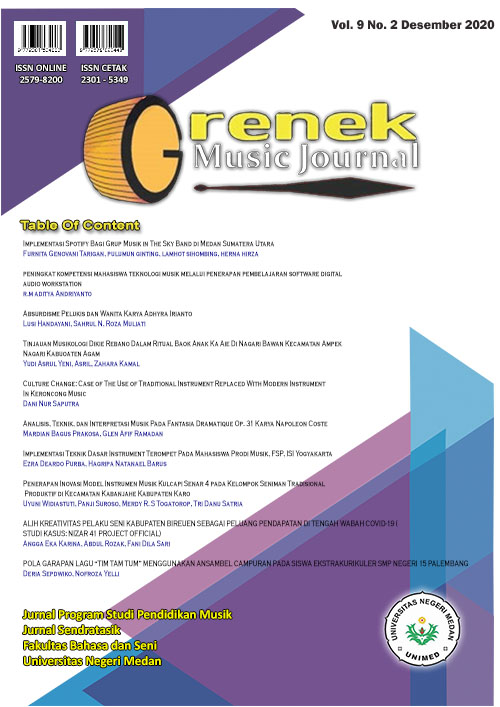CULTURE CHANGE: CASE OF THE USE OF TRADITIONAL INSTRUMENTS REPLACED WITH MODERN INSTRUMENTS IN KERONCONG MUSIC
Main Article Content
Abstract
As the development of science, technology, and external culture, individuals and groups face the challenges and major influences that enable changes in one's values, attitudes, and thinking patterns. Keroncong music is one type of music that is a result of the culture of society, especially the Javanese community. In technological developments, the existence of traditional music has been replaced by modern music. The method used in this study is a qualitative research method with a descriptive analytical approach. Technique of data analysis performed using reduction of the data, the presentation of the data, and verification. the results show that cultural change in case of instrument musical change in Keroncong music effected by lack of relationship with other societies, developed education system, attitude of valuing the work of others and strong desire to advance, open system society (open stratification), vested interest, existence of reclusive attitude and prejudice against new (foreign), barriers which are ideologically, custom or habit that has rooted, value that life This is in fact.
Article Details
Section
Grenek Music Journal

This work is licensed under a Creative Commons Attribution-ShareAlike 4.0 International License.
Authors published with the Grenek: Jurnal Seni Musik agree to the following terms:
- Authors retain copyright and grant the journal the right of first publication with the work simultaneously licensed under a Creative Commons Attribution License (CC BY-SA 4.0) that allows others to share the work with an acknowledgment of the work's authorship and initial publication in this journal.
- Authors are able to enter into separate, additional contractual arrangements for the non-exclusive distribution of the journal's published version of the work (e.g., post it to an institutional repository or publish it in a book), with an acknowledgment of its initial publication in this journal.
- Authors are permitted and encouraged to post their work online (e.g., in institutional repositories or on their website) prior to and during the submission process, as it can lead to productive exchanges, as well as earlier and greater citation of published work. (See The Effect of Open Access)
